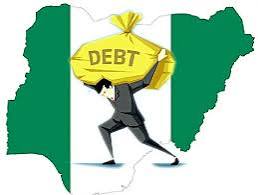Nigeria’s total public debt stock surged to N144.67tn ($94.23bn) as of December 31, 2024, reflecting a 48.58 per cent increase from the N97.34tn ($108.23bn) recorded a year earlier, the Debt Management Office has revealed.
The DMO disclosed the figures in its latest report released on Friday, showing an alarming year-on-year growth of N47.32tn in the country’s debt profile, amid rising concerns over the sustainability of Nigeria’s borrowing strategy.
On a quarter-on-quarter basis, the debt rose by N2.35tn or 1.65 per cent, from N142.32tn ($88.89bn) at the end of September 2024.
A breakdown of the debt components shows that external borrowings soared by 83.89 per cent, rising from N38.22tn ($42.50bn) in December 2023 to N70.29tn ($45.78bn) in December 2024.
This increase was largely driven by fresh foreign loans and the naira’s continued depreciation, which inflated the local currency value of dollar-denominated debts.
Domestic debt also recorded a 25.77 per cent rise, moving from N59.12tn ($65.73bn) to N74.38tn ($48.44bn) within the same period.
The bulk of this increase came from the Federal Government’s domestic borrowings, which jumped by 32.19 per cent from N53.26tn to N70.41tn, underscoring the administration’s sustained reliance on local sources to fund budget deficits and capital projects.
Conversely, domestic debts owed by state governments and the Federal Capital Territory dropped significantly by 32.27 per cent, falling from N5.86tn to N3.97tn, suggesting a more cautious debt posture among subnational entities.
Further analysis of the fourth-quarter data revealed that external debt increased by N1.4tn between September and December 2024, rising from N68.89tn ($43.03bn) to N70.29tn ($45.78bn), while domestic debt grew marginally by 1.29 per cent from N73.43tn to N74.38tn.
As of December 2024, the country’s debt composition showed a near-even split, with external debt accounting for 48.59 per cent and domestic debt making up 51.41 per cent of the total.
A closer look at the figures indicated that the Federal Government held the lion’s share of both external and domestic debts. It owed N62.92tn ($40.98bn) externally and N70.41tn ($45.86bn) domestically.
In contrast, states and the FCT held N7.37tn ($4.80bn) in external loans and N3.97tn ($2.58bn) in domestic debt.
Economic analysts have warned that the growing external debt, compounded by the naira’s depreciation, poses a risk to Nigeria’s fiscal stability.
They noted that rising debt servicing costs could strain the country’s already limited resources, especially if exchange rate pressures persist.
The latest figures come amid renewed calls for fiscal reforms and more efficient debt management strategies to avoid plunging the nation into a debt trap.
Do you want to share a story with us? Do you want to advertise with us? Do you need publicity for a product, service, or event? Contact us on WhatsApp +2348183319097 Email: platformtimes@gmail.com
We are committed to impactful investigative journalism for human interest and social justice. Your donation will help us tell more stories. Kindly donate any amount HERE




